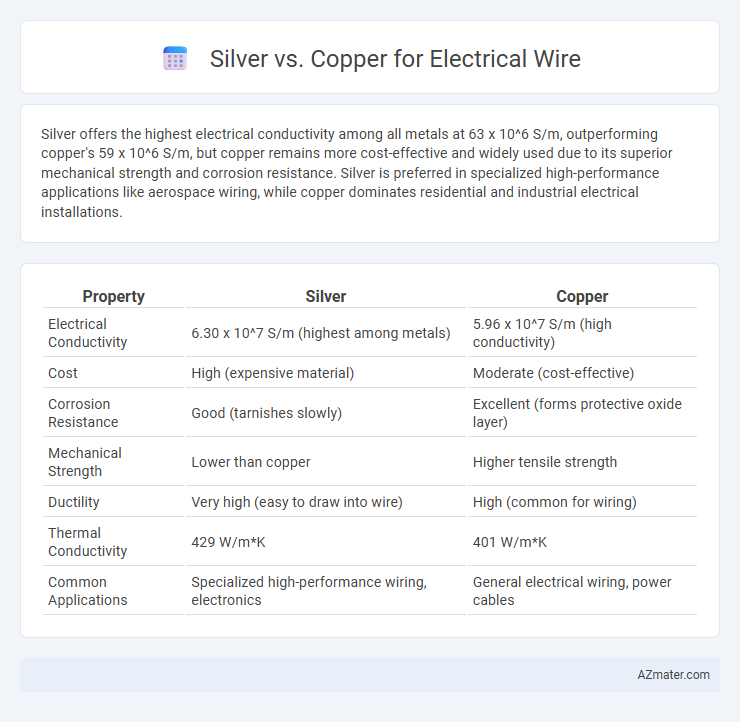Silver offers the highest electrical conductivity among all metals at 63 x 10^6 S/m, outperforming copper's 59 x 10^6 S/m, but copper remains more cost-effective and widely used due to its superior mechanical strength and corrosion resistance. Silver is preferred in specialized high-performance applications like aerospace wiring, while copper dominates residential and industrial electrical installations.
Table of Comparison
| Property | Silver | Copper |
|---|---|---|
| Electrical Conductivity | 6.30 x 10^7 S/m (highest among metals) | 5.96 x 10^7 S/m (high conductivity) |
| Cost | High (expensive material) | Moderate (cost-effective) |
| Corrosion Resistance | Good (tarnishes slowly) | Excellent (forms protective oxide layer) |
| Mechanical Strength | Lower than copper | Higher tensile strength |
| Ductility | Very high (easy to draw into wire) | High (common for wiring) |
| Thermal Conductivity | 429 W/m*K | 401 W/m*K |
| Common Applications | Specialized high-performance wiring, electronics | General electrical wiring, power cables |
Introduction: Silver vs Copper in Electrical Wiring
Silver exhibits the highest electrical conductivity among metals, surpassing copper by approximately 5%, making it ideal for applications requiring minimal resistance. Copper remains the dominant choice in electrical wiring due to its lower cost, excellent conductivity, and superior tensile strength. Comparing silver and copper involves assessing conductivity, cost-efficiency, and mechanical durability to determine the best material for specific electrical wiring needs.
Electrical Conductivity: How Silver and Copper Compare
Silver offers the highest electrical conductivity of all metals, with a conductivity value of approximately 63 x 10^6 S/m, outperforming copper, which has about 59.6 x 10^6 S/m. This superior conductivity means silver wires can conduct electricity with less resistance and energy loss compared to copper wires. Despite this advantage, copper remains the preferred choice due to its lower cost and better mechanical properties for electrical wiring applications.
Cost Analysis of Silver and Copper Wires
Silver wire offers superior electrical conductivity compared to copper but comes at a significantly higher cost, with silver prices often exceeding copper by a factor of 10 or more per unit weight. Copper remains the preferred choice for most electrical wiring due to its balance of conductivity, durability, and affordability, making it economically viable for large-scale applications. When analyzing the total cost of installation and long-term usage, copper wire provides a more cost-effective solution without compromising essential performance characteristics for standard electrical systems.
Durability and Longevity in Electrical Applications
Silver exhibits superior conductivity and corrosion resistance, which enhances its durability in electrical wire applications, especially in harsh or high-frequency environments. Copper, while slightly less conductive, offers excellent strength and resistance to fatigue, making it highly reliable and long-lasting in general electrical wiring systems. The cost-effectiveness and mechanical robustness of copper contribute to its widespread use, though silver's longevity benefits are preferred in specialized, high-performance electrical applications.
Corrosion Resistance: Silver vs Copper
Silver offers superior corrosion resistance compared to copper, maintaining excellent conductivity even under harsh environmental conditions. Copper tends to oxidize and develop a patina over time, which can reduce its effectiveness in electrical wiring applications. This corrosion-resistant property of silver makes it ideal for critical electrical components and connectors in high-performance or corrosive environments.
Thermal Conductivity and Heat Management
Silver exhibits the highest thermal conductivity among metals, approximately 429 W/m*K, surpassing copper's thermal conductivity of about 401 W/m*K, which enables superior heat dissipation in electrical wiring. This enhanced thermal performance in silver wire reduces the risk of overheating and allows for more efficient heat management in high-current applications. Copper remains more cost-effective and widely used but falls slightly behind silver in maintaining lower operational temperatures and thermal stability under heavy electrical loads.
Applications: Where Silver Wires Excel
Silver wires excel in high-performance electronic applications due to their superior electrical conductivity, which is approximately 6% higher than copper. They are preferred in specialized fields such as aerospace, military, and high-frequency RF connectors where minimal signal loss and maximum efficiency are critical. Despite higher costs, silver wires provide exceptional durability and corrosion resistance, making them ideal for precision instruments and sensitive electronic components.
Applications: Where Copper Wires Dominate
Copper wires dominate in residential, commercial, and industrial electrical wiring due to their excellent conductivity, affordability, and mechanical strength. They are widely used in power generation, transmission lines, and building wiring systems, where durability and cost-efficiency are critical factors. Copper's resistance to corrosion and ease of installation make it the top choice for most electrical applications compared to the more expensive silver wiring.
Environmental Impact and Sustainability
Silver electrical wires have a lower environmental impact during usage due to higher conductivity, which reduces energy loss and enhances efficiency, but the mining and refining of silver entail significant ecological disruption and resource depletion. Copper, while less conductive, is more abundant and easier to recycle, leading to a more sustainable lifecycle with lower environmental costs associated with extraction and waste. Choosing copper over silver can support sustainability goals by minimizing ecological damage through improved recyclability and reducing reliance on scarce precious metals.
Choosing the Right Material for Your Electrical Needs
Silver offers the highest electrical conductivity of all metals, making it ideal for specialized applications requiring maximum efficiency and low resistance, such as high-frequency or sensitive electronic equipment. Copper is widely preferred for general electrical wiring due to its excellent conductivity, cost-effectiveness, and durability in residential, commercial, and industrial installations. When choosing between silver and copper, consider factors such as conductivity requirements, budget constraints, corrosion resistance, and installation environment to ensure optimal performance and longevity.

Infographic: Silver vs Copper for Electrical Wire
 azmater.com
azmater.com